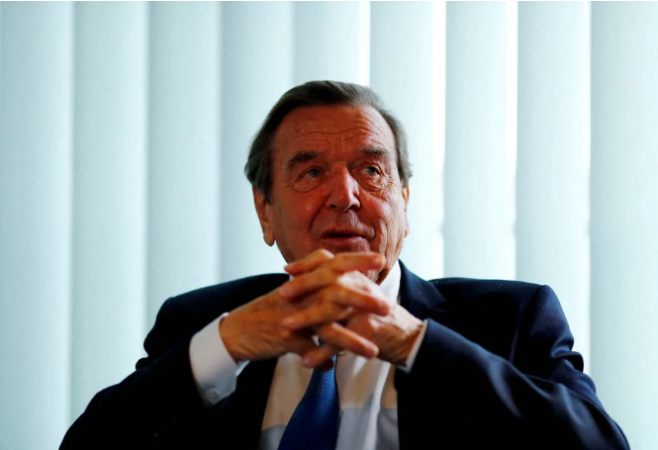
Germany: Germany's controversial former chancellor Gerhard Schroeder confirmed that he held a meeting with Vladimir Putin in Moscow last week and insisted the Kremlin was ready for talks to end the conflict in Ukraine.
"The good news is that the Kremlin wants a negotiated solution," Schroeder said in an interview with the German magazine Stern, published on Wednesday. The former leader of the Social Democratic Party claimed that despite being a "mistake", Russia's invasion of its neighbor could be solved.
He referred to a UN-mediated agreement between Moscow and Kyiv to unblock Ukrainian grain exports, saying "the first success is the grain deal, perhaps it can be gradually extended to a ceasefire."
From 1998 to 2005, Schroeder oversaw Europe's largest economy. She has faced criticism at home and abroad for maintaining a close personal relationship with Putin and working lucrative jobs for state-owned energy companies in Russia.
Many of Moscow's demands from the conflict were echoed in the former leader's plan for a settlement. Schroeder argued that Ukraine's claim to the Crimean peninsula, which Russia annexed in 2014, and its aspirations to join NATO, should be abandoned.
The solution to the Crimean crisis, according to Schroeder, "cannot be found in 99 years, as in Hong Kong, but in the next generation."
Although the Russian minorities there should be given special rights, the eastern Donbass should remain part of Ukraine.
Schroeder suggested that both sides should make concessions and suggested that Turkey could act as a mediator.
Schroeder, who attempted to speak to Putin a few weeks into the conflict, reiterated that he would stay with Putin, saying he could be "useful".
The Kremlin threatened to break diplomatic ties with Washington if the US called it a state sponsor of terrorism at the time of Schroeder's interview.
Russian Foreign Ministry spokeswoman Maria Zakharova called the proposed designation "stupid" and against international law.
She announced on Tuesday that "the logical consequence of such a move becomes a break in diplomatic relations." Washington runs the risk of eventually crossing the point of no return, which will be followed by all consequences. Washington should fully understand this.
A non-binding resolution urging Secretary of State Antony Blinken to designate Russia as a state sponsor of terrorism was approved by the Senate last week. Ukraine's President Volodymyr Zelensky has urged the US to use the designation.
However, Blinken objected to the plan, claiming that the proposed restrictions were similar to existing restrictions.
The US is reportedly directly involved in the conflict in Ukraine, along with arming Kyiv, according to accusations made by Russia.
According to the Russian Defense Ministry, Vadim Skbitsky, deputy head of Ukraine's military intelligence, told Britain's Telegraph newspaper that Washington was involved in the conflict, which is run by Putin's ally.
Skibitsky told the newspaper that although US officials were not directly providing information on the targeting, US and Ukrainian intelligence officials had consulted prior to the attacks and that Washington had effectively vetoed the targets.
The Russian Defense Ministry said in a statement on Tuesday that all this "indisputably proves that Washington, contrary to the claims of the White House and the Pentagon, is directly involved in the conflict in Ukraine."
"All Kyiv-sanctioned rocket attacks on civilian infrastructure and residential areas in populated areas of the Donbass and other regions, resulting in mass killings of civilians, are directly attributable to the Biden administration," the statement said.
The White House and the Pentagon did not immediately respond to the ministry's claims.
The Pentagon denied Moscow's claim that Russia had destroyed six US-made HIMARS missile systems since the start of the Ukraine war. Russia often claims that it has killed HIMARS but has never provided evidence.
Ukraine and the West regularly accuse Russia of carrying out destructive missile attacks on civilian targets. Both sides argue that civilians were deliberately targeted.
According to Ukraine's Zelensky, despite receiving weapons from the West, his nation's forces are still unable to overcome Russian advantages in heavy weapons and manpower.
This is especially noticeable in the Donbass during the war. There, it's just hell. It is beyond description.
Some of the fiercest fighting in the war has taken place in the Donbass, Ukraine's traditional industrial stronghold in the east.
On 24 February, as part of what it refers to as a "special military operation", Russia sent thousands of troops to Ukraine. It is depicted as an indiscriminate war of invasion by Kyiv and the West.
Igor Vishnevsky, deputy director of the Russian Foreign Ministry's Department of Non-Proliferation and Arms Control, denied all claims. "unprovoked aggression" at a UN conference on Tuesday. Moscow, he continued, was of the opinion that nuclear war "must never be fought."
Alexander Trofimov, a Russian diplomat, told the UN that Moscow would only use nuclear weapons in response to a conventional or weapons of mass destruction attack that endangered the survival of the Russian state.
According to Trofimov, a senior diplomat in the Russian foreign ministry's non-proliferation and arms control division, "neither of these two hypothetical scenarios is relevant to the situation in Ukraine."
First shipment from Ukraine carrying 'corn and hope' en route Lebanon
Oil Crisis: India steps up diplomacy to buy oil from Russian Far East